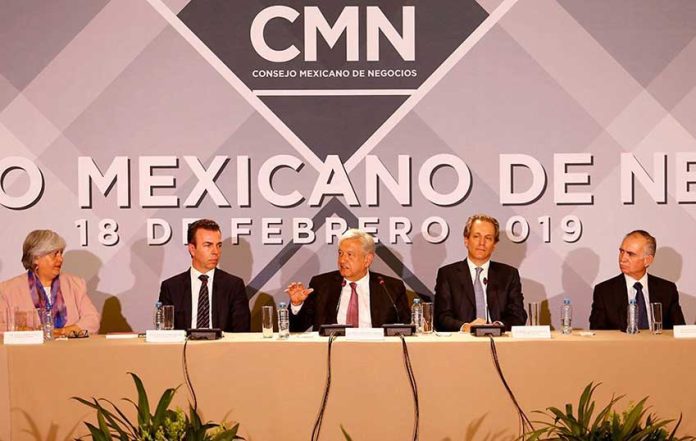Despite suffering setbacks such as the cancellation of the new Mexico City airport project and the freezing of the 2014 energy reform, Mexico’s business leaders continue to give President López Obrador the benefit of the doubt.
The president met yesterday with members of the Mexican Business Council (CMN) – an elite group made up of 60 of the largest businesses in the country – who made it clear that they remain willing to collaborate with the new government to achieve greater economic growth and prosperity.
While business leaders didn’t reproach López Obrador for his decision to scrap the partially built US $13-billion airport at Texcoco, México state, or bring up the energy reform issue, the meeting wasn’t a total love fest: criticism was leveled at the president for his government’s handling of teachers’ recent rail blockades in Michoacán and strike action in Tamaulipas.
Both the blockades, which lasted for a month, and the strikes in the northern border city of Matamoros caused significant damage to the economy and, according to the CMN members, sent a negative message to investors.
Antonio del Valle Perochena, who was sworn in yesterday as the council’s new president, said the private sector is committed to investing in Mexico and supporting the government, but stressed that respect for the nation’s institutions and strengthening the rule of law are needed to ensure that the confidence of investors is maintained.
Del Valle Perochena, who is also chairman of petrochemical and banking conglomerate Grupo Kaluz, added that “as Mexicans, it’s our duty to contribute” to the achievement of the government’s goals of improving security, combatting corruption, stimulating economic growth and generating well-being.
The businessman said that member companies of the CMN could invest more than US $31 billion in Mexico this year but explained that they are waiting for the government to complete its National Development Plan (PND), which will set the economic course for the next six years, before they finalize their plans.
“We’re working together with the federal government to establish the [plan] . . . At the start of all six-year presidential terms . . . there are a lot of projects to do and the PND is going to define a lot of things . . . Our greatest interest is to invest in the country and to create jobs,” he said.
In his address to the business leaders, López Obrador said: “If there is growth, there are jobs. If there are jobs, there is well-being. If there is well-being, there is peace. That’s the route we must go down . . . You are fundamental to achieving growth and well-being but mainly growth because it’s very important that you invest and create jobs . . .”
However, outgoing CMN president Alejandro Ramírez pointed out that jobs are threatened by strikes in Matamoros and warned that more than 1,200 companies could be affected in Tamaulipas alone if the job action spreads.
The CEO of the cinema chain Cinépolis also questioned why “a small group of protesters” was permitted to maintain rail blockades in Michoacán that “caused losses of more than 24 billion pesos,” contending that a “bad precedent” had been set and that the government’s inaction sent “a negative message about the prevalence of the rule of law.”
López Obrador refused to use force to remove teachers from railway tracks and even sought an opinion from the National Human Rights Commission (CNDH) about what to do to end the blockades, only to have the commission say the government shouldn’t delegate its responsibilities to protect people’s rights.
Following the meeting, former CMN president and chairman of Kimberley Clark de México, Claudio X. González Laporte, told reporters that behind closed doors, he expressed his concern to López Obrador about the possibility that Mexico’s sovereign credit rating could be downgraded.
There is increasing speculation that debt in excess of US $100 billion owed by Pemex could push Mexico’s credit rating below investment grade in the coming years.
The rescue plan for the state oil company, announced by the president last week, was described as insufficient and disappointing by financial institutions, while Fitch Ratings warned that it doesn’t insulate the state oil company against future cuts to its credit rating, which it currently places just one notch above junk status.
González said López Obrador expressed his commitment to maintaining Mexico’s standing as a safe investment destination, adding that the private sector will do all it can to “retain investment grade [ratings] both for Pemex and the country.”
Yesterday’s meeting between the CMN and López Obrador came after the president announced the creation of a new government investment council at an event in Mexico City.
Source: El Economista (sp)
